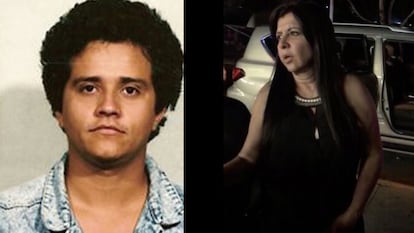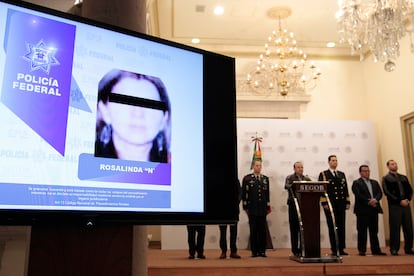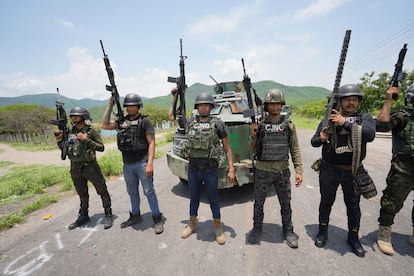The downfall of Rosalinda González, leading figure of a powerful Mexican drug cartel
The wife of Nemesio Oseguera, who was arrested on Monday, is accused of secretly controlling the finances of one of the world’s most feared narco groups: Jalisco New Generation

To many, she is simply known as “La Jefa,” or the boss. While Rosalinda González Valencia, 58, is married to Nemesio “El Mencho” Oseguera Cervantes, who founded Mexico’s Jalisco New Generation Cartel (CJNG), her own family background and business acumen have led her to stand accused of a slate of crimes in her own right.
González Valencia was arrested on Monday in an army operation in Zapopan, on the outskirts of Guadalajara. But this is not the first time El Mencho’s wife and leader of the Valencia clan has been captured. Her husband’s meteoric rise in the narco world has spread terror and chaos to every corner of Mexico. But El Mencho’s story cannot be explained without Valencia’s. The business-savvy niece of a powerful 1990s-era narco and heiress to a criminal clan, she has propelled the Jalisco gangs to where they are today. The fall of La Jefa has shaken the most feared cartel in the country, even with her five brothers and two sons already in custody.
The first time Rosalinda set foot in jail was May 2018, also in Zapopan, shortly before Andrés Manuel López Obrador won Mexico’s last presidential election. The previous government of Enrique Peña Nieto had waged a war against the Jalisco cartel, but in September of that year, she was released after paying bail of 1.5 million pesos (about $72,000, or €64,000). In June of this year, a federal judge once again linked her with a network of 73 companies that laundered 1.1 billion pesos (about $53 million, €47 million) for the cartel between 2015 and 2016. But the magistrate concluded that there was insufficient evidence and she was released again.
Rosalinda’s criminal career did not begin with her marriage, according to the Mexican authorities. Her uncle and family patriarch, Armando Valencia, alias “El Maradona,” founded one of the most powerful cartels in the 1990s, the Milenio cartel. Originally from Michoacán, which is the center of Mexico’s avocado export industry, the family realized early on how to diversify their business from marijuana and Colombian cocaine to synthetic drugs. The Milenio family were among the first to specialize in producing this type of drug. Rosalinda and her siblings – authorities estimate there are around 15 of them, although the figure varies from 12 to 18 – have since dedicated themselves to growing the family drug business. Years later, they regrouped to form the notorious money laundering cartel known as Los Cuinis. The gang’s name comes from a small squirrel known in Michoacán as a cuinique that reproduces at a rapid rate. The cartel has been in the sights of the US authorities since 2015.

Los Cuinis were led by Rosalinda’s brother Abigael, who was imprisoned in 2015. The United States Drug Enforcement Administration (DEA) and the Mexican Attorney General’s Office accuse them of functioning as the financial and business arm of the powerful Jalisco New Generation Cartel: they are considered two sides of the same coin. El Mencho’s cartel is in charge of drug trafficking and waging war on enemy territories, and is responsible for much of Mexico’s escalating violence. Los Cuinis, meanwhile, have dedicated themselves to building a business empire that includes beauty clinics, hotels and restaurants, allowing the cartel to launder its money and consolidate itself financially.
In 2015, the DEA declared that the combined financial clout of the two cartels made them the richest in the world. Abigael was captured in Puerto Vallarta, Jalisco state, and is still fighting extradition proceedings that would see him face trial in the United States. Four more brothers – José, Gerardo, Arnulfo and Ulises – have since been arrested. José was extradited to the United States a week ago from Brazil, where he fled after Abigael’s capture.
Rosalinda and El Mencho’s marriage sealed the alliance of two powerful clans, combining weapons from his side and dollars from hers. El Mencho, 55, is also originally from Michoacán, and had worked with the Valencia family since he was very young, guarding their avocado fields and later working as a drug trafficker on their behalf. He left for the US as an illegal immigrant at the age of 14, like many of the Valencia brothers. He was arrested at 20 for drug possession and deported, but soon returned. In 1994, at the age of 28, he was arrested for selling heroin and sent back to Mexico once again. Some link him to Abigael and a drug trafficking network operating in California during those years. Together, they would go on to form a powerful criminal alliance.
The hunt for Los Cuinis has claimed other targets, including Rosalinda and El Mencho’s only son, Rubén Oseguera, alias “El Menchito.” The future heir to the cartel was arrested in 2015 and extradited to the US in 2020, after three failed attempts to capture and prosecute him in Mexico. The cartel avenged the extradition with the murder of one of the Mexican judges linked to the process, Uriel Villegas, who was gunned down along with his wife. A few days after El Menchito set foot on US soil, his sister Jessica Johanna Oseguera was also arrested after attending his court hearing.
Hours after Rosalina Valencia was arrested, two Mexican marines went missing, Mexican authorities told EL PAÍS. The daughter of Rosalina and El Mencho, Laisha Oseguera is suspected of orchestrating the kidnapping, allegedly in revenge for her mother’s arrest.

Rosalinda and El Mencho rode the wave of Mexico’s narco boom together in the 1990s, and made it through the horrific violence of the battles between drug cartels in the 2000s. Harassment by the bloodthirsty Zeta cartel caused the Valencias to flee Michoacán. What was left of the Milenio cartel formed the armed wing of the older Sinaloa cartel, with a plan to take the Zetas down together. Before they called themselves Jalisco New Generation, they were known as the Matazetas or Zeta Killers. In September 2011, the emerging cartel left 35 corpses on a street in the heart of Zeta territory. And in 2015, they separated from the Sinaloa gang and formed their own organization. That year, after a failed operation to arrest El Mencho, they shot down a military helicopter with a rocket launcher.
Mencho’s cartel had been growing in the shadow of better-known entities. While the security forces focused on breaking up the Sinaloa and Zeta organizations during the war on drugs of former president Felipe Calderón, which was continued by Enrique Peña Nieto until 2018, the Jalisco New Generation Cartel began occupying the space left by its enemies.
Rosalinda’s family laundered the money that financed drug wars, paid off corrupt officials and enabled the complex drug trafficking scheme that has turned Jalisco New Generation Cartel into the most powerful in the country, along with the Sinaloa cartel. Between them, they now control Mexico’s entire national territory and have stoked terrible levels of violence, with more than 100,000 people disappeared and almost 100 homicides a day. Rosalinda’s arrest means the net is closing in on her husband. Of the original founders of the two-headed cartel, only El Mencho and Rosalinda’s younger sisters remain at large.
Tu suscripción se está usando en otro dispositivo
¿Quieres añadir otro usuario a tu suscripción?
Si continúas leyendo en este dispositivo, no se podrá leer en el otro.
FlechaTu suscripción se está usando en otro dispositivo y solo puedes acceder a EL PAÍS desde un dispositivo a la vez.
Si quieres compartir tu cuenta, cambia tu suscripción a la modalidad Premium, así podrás añadir otro usuario. Cada uno accederá con su propia cuenta de email, lo que os permitirá personalizar vuestra experiencia en EL PAÍS.
¿Tienes una suscripción de empresa? Accede aquí para contratar más cuentas.
En el caso de no saber quién está usando tu cuenta, te recomendamos cambiar tu contraseña aquí.
Si decides continuar compartiendo tu cuenta, este mensaje se mostrará en tu dispositivo y en el de la otra persona que está usando tu cuenta de forma indefinida, afectando a tu experiencia de lectura. Puedes consultar aquí los términos y condiciones de la suscripción digital.









































